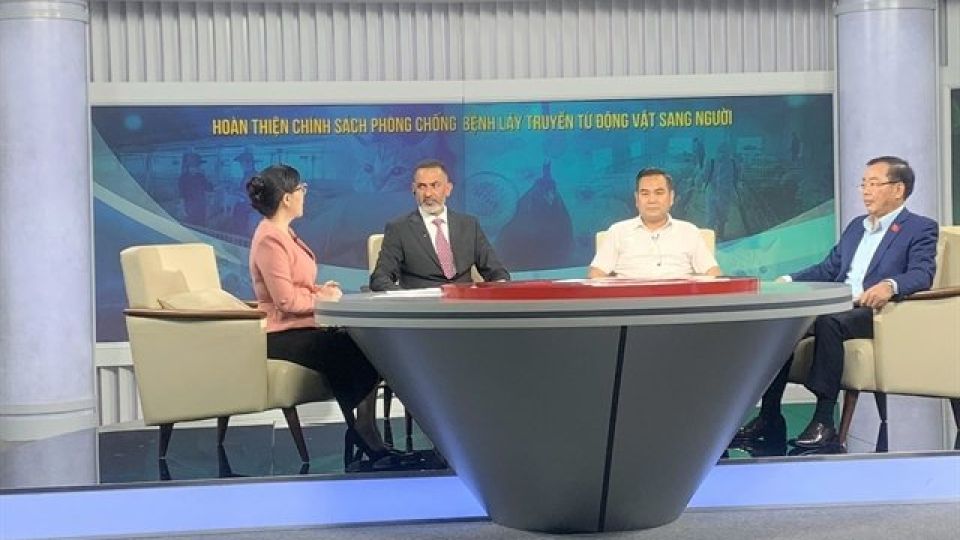December 5, 2024
HANOI – Experts have addressed the urgent need to stop the dog and cat meat trade in Việt Nam at a policy dialogue broadcasted on the Việt Nam National Assembly Television (VNATV) on December 3.
The programme brought together key national stakeholders and international experts to examine policy solutions for this pressing issue, while also considering its implications for public health, including rabies prevention.
A recent survey shows that in Việt Nam, Cambodia and Indonesia alone, an estimated 10 million dogs and cats are killed for their meat annually, including approximately five million dogs and one million cats in Việt Nam. The trade of cat and dog meat impacted public safety, animal welfare and Việt Nam’s international reputation, prompting a call for immediate comprehensive intervention.
Speaking at the event, National Assembly deputy and National Assembly’s Committee on Science, Technology and Environment member Nguyễn Quang Huân said that effectively solving the critical issue of dog and cat meat trade requires comprehensive policy solutions.
“Việt Nam currently lacks specific laws prohibiting these acts while waiting for a comprehensive new law will take a long time. Instead of waiting, we should focus on implementing a Government decree specifically regulating the trade, transportation and slaughter of dogs and cats,” said Deputy Huân.
“Hà Nội needs to take the lead in piloting this initiative, then expand it nationwide.” .
The dialogue discussed several critical dimensions of cat and dog meat trading, including the economic impact on Việt Nam’s tourism sector, particularly in major destinations such as Hà Nội and HCM City. Speakers also shared successful case studies from other Asian nations, including South Korea’s recent systematic approach to ending dog meat trade through legislative reform.
“In recent years, Hà Nội has paid special attention to control rabies and the trade, transport and slaughter of dogs and cats. The city has also implemented comprehensive directions and issued multiple documents to guide departments, sectors and district authorities in rabies prevention,” Deputy Head of Hà Nội City’s Sub-Department of Animal Husbandry, Fisheries and Veterinary Medicine Ngô Đình Loát said.
The capital city issued its plan in line with the National Target Programme for Rabies Prevention and Control in 2022-30. The programme focuses on strictly domestic dog management, mandatory rabies vaccination for all dogs and cats, post-exposure preventive treatment for humans, establishing rabies-free zones and control of dog and cat transportation and trade.
“This trade poses significant risks to public health and animal welfare,” said Rahul Sehgal, International Communications Director at Soi Dog Foundation.
“Hà Nội’s innovative approach shows how targeted policy reform can transform traditional practices. We are committed to supporting the complete elimination of this trade through comprehensive educational campaigns, law enforcement training and assistance in developing alternative livelihoods for those currently involved in the industry,” said Sehgal.
At the dialogue, experts proposed several key recommendations leading to a rabies-free Việt Nam and the elimination of dog and cat meat trade such as developing enforcement mechanisms and penalties for violations and creating a framework for transitioning businesses away from the trade. They also suggested strengthening the public education programme and enhancing Việt Nam’s alignment with international standards on animal welfare practices.
By reaching millions of Vietnamese households through VNATV’s platform, the dialogue is expected to spark unprecedented public discourse on ending the dog and cat meat trade. The broadcast will serve as a vital educational tool for local authorities and communities, helping to build consensus around new policy initiatives while fostering a deeper understanding of the need for reform.
Social and Behaviour Change Director of Intelligentmedia Bùi Duyên added: “Television programmes, particularly dialogue sessions featuring National Assembly delegates and leading experts, catalyse profound social change. By engaging authorities and communities, these discussions create momentum for concrete actions in addressing the dog and cat meat trade. This marks a pivotal first step in our focused, systematic approach to intervention and transformation.”


